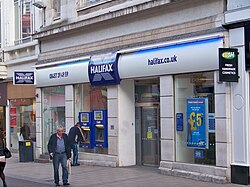This article includes a list of references, related reading, or external links, but its sources remain unclear because it lacks inline citations .(July 2023) |
| Part of a series on financial services |
| Banking |
|---|
 |

Retail banking, also known as consumer banking or personal banking, is the provision of services by a bank to the general public, rather than to companies, corporations or other banks, which are often described as wholesale banking (corporate banking).
Contents
Banking services which are regarded as retail include provision of savings and transactional accounts, mortgages, personal loans, debit cards, and credit cards. Retail banking is also distinguished from investment banking or commercial banking. It may also refer to a division or department of a bank which deals with individual customers. [1]
In the U.S., the term commercial bank is used for a normal bank to distinguish it from an investment bank. After the Great Depression, the Glass–Steagall Act restricted normal banks to banking activities, and investment banks to capital market activities. That distinction was repealed in the 1990s. Commercial bank can also refer to a bank or a division of a bank that deals mostly with deposits and loans from corporations or large businesses, as opposed to individual members of the public (retail banking).
